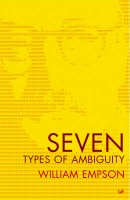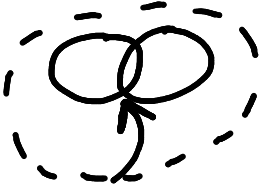Meeting with Ed.D. thesis supervisor: digital literacy & ambiguity
I learned several things in my Skype chat with my Ed.D. thesis supervisor (Steve Higgins) this week, notably:
- I’m a pearl-grower
- People can be metaphorical in different ways
- How ambiguity can be productive
Our conversation
 Steve was very interested in what I’d mentioned in our brief email conversation earlier this month about different types of ambiguity. After reading William Empson’s Seven Types of Ambiguity (Wikipedia)recently I’ve realised that the terms that I’ve been analysing in the literature – ‘digital literacy’, ‘electracy’, information competence’, and the like – are actually ambiguous in different ways.
Steve was very interested in what I’d mentioned in our brief email conversation earlier this month about different types of ambiguity. After reading William Empson’s Seven Types of Ambiguity (Wikipedia)recently I’ve realised that the terms that I’ve been analysing in the literature – ‘digital literacy’, ‘electracy’, information competence’, and the like – are actually ambiguous in different ways.
In fact, the level of ambiguity and lack of clarity can depend upon the ‘level’ at which people are working. So, for the teenager at school talking about ‘digital literacy’ isn’t productive or helpful. For the university professor, on the other hand, it could create a productive space in which to discuss one or more concepts.
Steve mentioned that I need to be careful about different positions taken by thinkers about literacy. Radicalists, for example, would argue that the way that you become literate affects the way you are literate later. This all links into the seven types of ambiguity mentioned above. I think that, given that Empson was considering mainly poetry and works of literature, there may be scope in my thesis to collapse or discard two or more types of ambiguity.
The problem about New Literacies is that they potentially lead to ‘infinite literacies’. For example, I’ve seen studies that seem to consider the use of Flickr as requiring a separate ‘literacy’ than, for example, Facebook. If there is such a thing as ‘digital literacy’ then it would need to be a level up from this – a complex organizing construct that could explain such affinity spaces. 🙂
Moving on to the structure of my thesis, I explained to Steve that I’m thinking about moving the location of my discussion on the Pragmatic method to the beginning of my thesis. If it went after the Literature Review, as originally planned, then it would seem a bit out-of-kilter. If so, that would give me the following structure:
- Pragmatic method (plus discussion of other lenses that can be used)
- Literature Review (including evolution of New Literacies)
- Discussion and analysis of seven types of ambiguity
- Analyse digital literacy (and other concepts) as constructs (do they have pragmatic utility?)
- Review of terminology used in government, NGO and media reports (e.g. Singapore, BBC, NGOs, UK, USA – what do people mean by digital literacy? is it a productive ambiguity?)
- Digital Flow as a more coherent and less ambiguous construct
Steve noted that ‘digital literacy’ is a term used mainly by digital enthusiasts. It creates a positive space or construct for people to explore shared meanings. I thought this was an interesting idea and brought up the idea of a continuum of positions people could take. Steve expanded on this to say that it’s as if the whole of the Venn diagram can be discussed rather than just the intersect:- includes the whole of the Venn diagram rather than just the intersect:

My ‘Norwegian analysis’ (as Steve calls it) contains a metaphorical aspect which is at heart of way the term has evolved. It creates a ‘productive space’ which may or may not be useful. By moving computer skills into the ‘literacy’ domain the debate is altered as a ‘value space’ has been created. After all, no-one is going to argue about the utility of a literacy. This could be a useful segué into the section about the what the media and governments say about digital literacy and related concepts.
Regarding my final section on ‘flow’ I mentioned how in the literature it is used most in relation to computer games. Steve mentioned that he has an unpublished presentation/paper on how interactive whiteboards (IWBs) develop teacher didactic ‘flow’ (in that they control IWB with one hand and class with another). The IWB encourages whole-class presentation, with more answers from students, but less depth. The teacher ends up in some kind of bubble which becomes less and less permeable. They are in control of resources; lessons ‘progress’ but without the cognitive dissonance required.
I was concerned that I wasn’t discovering academic journal articles in the most efficient mannter. I explained to Steve my method:
- Find recent relevant, high-quality journal article using Google Scholar
- Scour reference section for relevant articles.
- Go through relevant articles and repeat.
Steve calls this pearl-growing and apparently it’s a popular method. He did, however, mention that ‘forward-tracking’ via services such as Google Scholar is also useful. Steve also recommended keyword searching at the Web of Science and directly within the archives of relevant journals. The problem with everyone ‘pearl-growing’ I pointed out is that, like the iPhone App Store, once something becomes slightly popular, it will become exponentially more so. Steve said that his colleague, Peter Timms, had found that there is evidence to this effect as there is no strong correlation between the quality of references in academic papers and the quality of the article itself.
Moving on we discussed the problem of ‘solidification’. As I’ve referenced before, Allan Martin has written on the idea of ‘liquid modernity’. This is the idea that by the time research has been done and social norms have begun to emerge, the technology has moved on. What Steve wondered, however, was whether this is true from this point forward (i.e. we will be in this situation forever more) or whether it’s for a finite period of time. I pointed out that my historical research has shown that people pretty much always think they’re living through times of rapid change! Steve quite rightly pointed out the difference between technological and conceptual things changing. Something to dwell on… :-p
The problem with such a nebulous concept as ‘digital literacy’ is that it can collapse to meaning no more than ‘having access to digital texts’. Steve and I discussed the importance of ‘knowing’ (in terms of internalization and understanding). All an individual can do on the first attempt is to assimilate information and value judgements into what W.V. Quine would call an individual’s web of belief. It would be interesting to explore the extent to which new concepts such as ‘digital literacy’ restructure belief systems (as oppose to merely being assimilated)
This led onto my wondering about ‘digital epistemologies’ – especially as Richard Rorty claims that pragmatists don’t have an epistemology. Steve though that, although he would have to check, Rorty means by this that pragmatists don’t have a single epistemology. They are more agile than thinkers holding different positions.
I thought that this potentially linked together our discussion of ‘liquid modernity’ with the idea of a ‘web of beliefs’. Pragmatists have a more fluid and changeable web of beliefs, meaning they are better situated when faced with fluid change. It’s something I’m going to think about putting into the first section of my thesis. 😀
Finally, Steve and I discussed the difference between C.S. Peirce (a community of inquirers would find truth in the long run) and Richard Rorty (there is no ‘truth’ to find). Peirce, coming before Thomas Kuhn, didn’t take into account paradigm shifts where the graph of what constitutes ‘normal science’ is forever having to restart. Although Peirce can be interpreted in a Postmodern way, Steve is more comfortable interpreting him towards the Realist end of the spectrum. That is to say: Peirce believed that the external world exists and there are truths to be known, it’s just that we as humans aren’t in a position to do that. The difference between Rorty and earlier pragmatists, suggested Steve, is that Rorty came from a strongly libertarian standpoint, whereas Dewey, for example, was more of a communitarian.
The hour went very quickly. Lots to think about and lots of work to do! 🙂
(pearl image CC BY Vali… & web image CC BY josef.stuefer)





![Reblog this post [with Zemanta]](http://img.zemanta.com/reblog_e.png?x-id=59a9a67b-6acb-4a18-9576-c36068c26778)